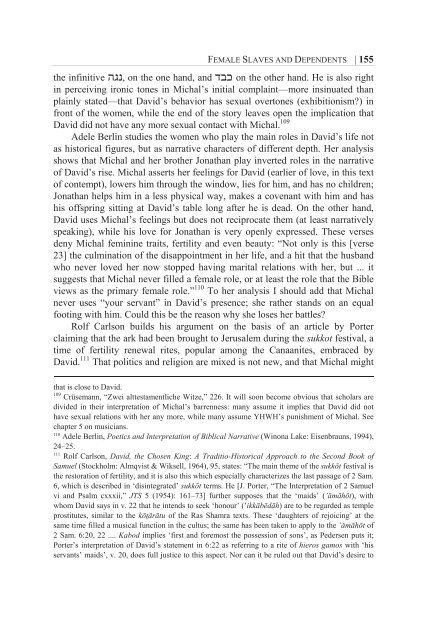Women at Work in the Deuteronomistic History - International Voices ...
Women at Work in the Deuteronomistic History - International Voices ...
Women at Work in the Deuteronomistic History - International Voices ...
You also want an ePaper? Increase the reach of your titles
YUMPU automatically turns print PDFs into web optimized ePapers that Google loves.
FEMALE SLAVES AND DEPENDENTS | 155<br />
<strong>the</strong> <strong>in</strong>f<strong>in</strong>itive הגנ, on <strong>the</strong> one hand, and דבכ on <strong>the</strong> o<strong>the</strong>r hand. He is also right<br />
<strong>in</strong> perceiv<strong>in</strong>g ironic tones <strong>in</strong> Michal’s <strong>in</strong>itial compla<strong>in</strong>t—more <strong>in</strong>s<strong>in</strong>u<strong>at</strong>ed than<br />
pla<strong>in</strong>ly st<strong>at</strong>ed—th<strong>at</strong> David’s behavior has sexual overtones (exhibitionism?) <strong>in</strong><br />
front of <strong>the</strong> women, while <strong>the</strong> end of <strong>the</strong> story leaves open <strong>the</strong> implic<strong>at</strong>ion th<strong>at</strong><br />
David did not have any more sexual contact with Michal. 109<br />
Adele Berl<strong>in</strong> studies <strong>the</strong> women who play <strong>the</strong> ma<strong>in</strong> roles <strong>in</strong> David’s life not<br />
as historical figures, but as narr<strong>at</strong>ive characters of different depth. Her analysis<br />
shows th<strong>at</strong> Michal and her bro<strong>the</strong>r Jon<strong>at</strong>han play <strong>in</strong>verted roles <strong>in</strong> <strong>the</strong> narr<strong>at</strong>ive<br />
of David’s rise. Michal asserts her feel<strong>in</strong>gs for David (earlier of love, <strong>in</strong> this text<br />
of contempt), lowers him through <strong>the</strong> w<strong>in</strong>dow, lies for him, and has no children;<br />
Jon<strong>at</strong>han helps him <strong>in</strong> a less physical way, makes a covenant with him and has<br />
his offspr<strong>in</strong>g sitt<strong>in</strong>g <strong>at</strong> David’s table long after he is dead. On <strong>the</strong> o<strong>the</strong>r hand,<br />
David uses Michal’s feel<strong>in</strong>gs but does not reciproc<strong>at</strong>e <strong>the</strong>m (<strong>at</strong> least narr<strong>at</strong>ively<br />
speak<strong>in</strong>g), while his love for Jon<strong>at</strong>han is very openly expressed. These verses<br />
deny Michal fem<strong>in</strong><strong>in</strong>e traits, fertility and even beauty: “Not only is this [verse<br />
23] <strong>the</strong> culm<strong>in</strong><strong>at</strong>ion of <strong>the</strong> disappo<strong>in</strong>tment <strong>in</strong> her life, and a hit th<strong>at</strong> <strong>the</strong> husband<br />
who never loved her now stopped hav<strong>in</strong>g marital rel<strong>at</strong>ions with her, but ... it<br />
suggests th<strong>at</strong> Michal never filled a female role, or <strong>at</strong> least <strong>the</strong> role th<strong>at</strong> <strong>the</strong> Bible<br />
views as <strong>the</strong> primary female role.” 110 To her analysis I should add th<strong>at</strong> Michal<br />
never uses “your servant” <strong>in</strong> David’s presence; she r<strong>at</strong>her stands on an equal<br />
foot<strong>in</strong>g with him. Could this be <strong>the</strong> reason why she loses her b<strong>at</strong>tles?<br />
Rolf Carlson builds his argument on <strong>the</strong> basis of an article by Porter<br />
claim<strong>in</strong>g th<strong>at</strong> <strong>the</strong> ark had been brought to Jerusalem dur<strong>in</strong>g <strong>the</strong> sukkot festival, a<br />
time of fertility renewal rites, popular among <strong>the</strong> Canaanites, embraced by<br />
David. 111 Th<strong>at</strong> politics and religion are mixed is not new, and th<strong>at</strong> Michal might<br />
th<strong>at</strong> is close to David.<br />
109<br />
Crüsemann, “Zwei alttestamentliche Witze,” 226. It will soon become obvious th<strong>at</strong> scholars are<br />
divided <strong>in</strong> <strong>the</strong>ir <strong>in</strong>terpret<strong>at</strong>ion of Michal’s barrenness: many assume it implies th<strong>at</strong> David did not<br />
have sexual rel<strong>at</strong>ions with her any more, while many assume YHWH’s punishment of Michal. See<br />
chapter 5 on musicians.<br />
110 Adele Berl<strong>in</strong>, Poetics and Interpret<strong>at</strong>ion of Biblical Narr<strong>at</strong>ive (W<strong>in</strong>ona Lake: Eisenbrauns, 1994),<br />
24–25.<br />
111 Rolf Carlson, David, <strong>the</strong> Chosen K<strong>in</strong>g: A Traditio-Historical Approach to <strong>the</strong> Second Book of<br />
Samuel (Stockholm: Almqvist & Wiksell, 1964), 95, st<strong>at</strong>es: “The ma<strong>in</strong> <strong>the</strong>me of <strong>the</strong> sukkōt festival is<br />
<strong>the</strong> restor<strong>at</strong>ion of fertility, and it is also this which especially characterizes <strong>the</strong> last passage of 2 Sam.<br />
6, which is described <strong>in</strong> ‘dis<strong>in</strong>tegr<strong>at</strong>ed’ sukkōt terms. He [J. Porter, “The Interpret<strong>at</strong>ion of 2 Samuel<br />
vi and Psalm cxxxii,” JTS 5 (1954): 161–73] fur<strong>the</strong>r supposes th<strong>at</strong> <strong>the</strong> ‘maids’ (’ămāhōt), with<br />
whom David says <strong>in</strong> v. 22 th<strong>at</strong> he <strong>in</strong>tends to seek ‘honour’ (’ikkābēdāh) are to be regarded as temple<br />
prostitutes, similar to <strong>the</strong> kōtārātu of <strong>the</strong> Ras Shamra texts. These ‘daughters of rejoic<strong>in</strong>g’ <strong>at</strong> <strong>the</strong><br />
same time filled a musical function <strong>in</strong> <strong>the</strong> cultus; <strong>the</strong> same has been taken to apply to <strong>the</strong> ’ămāhōt of<br />
2 Sam. 6:20, 22 .... Kabod implies ‘first and foremost <strong>the</strong> possession of sons’, as Pedersen puts it;<br />
Porter’s <strong>in</strong>terpret<strong>at</strong>ion of David’s st<strong>at</strong>ement <strong>in</strong> 6:22 as referr<strong>in</strong>g to a rite of hieros gamos with ‘his<br />
servants’ maids’, v. 20, does full justice to this aspect. Nor can it be ruled out th<strong>at</strong> David’s desire to




